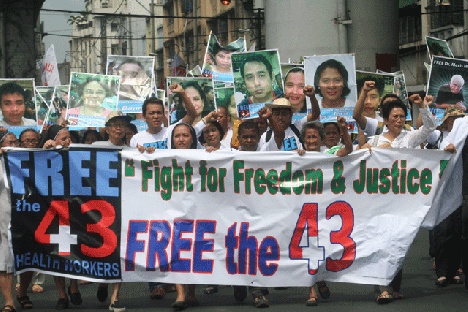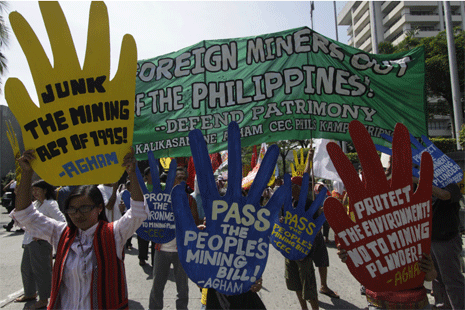We challenge the Aquino administration to do everything in its authority and influence to ensure that Mrs. Gloria Macapagal-Arroyo will not flee the country. She should be made accountable for all the crimes she committed against the people!”
Gary Liberal, R.N., spokesperson of the Morong 43 and one of the plaintiffs named in the civil suit filed on April 4, 2011 against GMA, etal. at the Quezon City Regional Trial Court, reminded the Aquino administration that it should not forget the victims of human rights violations such as the Morong 43 case committed under GMA’s term.
Liberal, speaking in behalf of the 36 freed health workers and said that they are enraged of Mr. Aquino’s inability to act upon the cases filed against his predecessor such as to immediately free 2 of the Morong 43 who were transferred and still illegally detained in Mindoro. “Obviously, the President took a sweet time before hastily filing an electoral fraud case against GMA. Such obvious haste was unnecessary had Mr. Aquino acted swiftly on scores of other cases such as our illegal arrest and detention, the killing of Mr. Leonard Co, enforced disappearances, extrajudicial killings, and the Ampatuan massacre among others.”
Seven months since they filed a civil suit suing for damages totaling P15 million for physical and psychological torture and other forms of indignities they suffered during their illegal arrest and detention, the case has not moved beyond the first and last hearing on June 2011.
Defendants named in the suit are former President Gloria Macapagal-Arroyo, former Defense Secretary Norberto Gonzales, former Chief of Staff Gen. Victor Ibrado, Gen. Delfin N. Bangit, former commander of the 2nd Infantry Division (ID) Gen. Jorge Segovia, commander of the intelligence unit of the 2nd IDPA Lt. Col. Cristobal Zaragosa, 2nd IDPA Warden Major Manuel Tabion, commander of the 202nd Infantry Batallion (IB) Col. Aurelio Baladad, 16th IBPA commander Lt. Col. Jaime Abawag, and Rizal Provincial Police Office commander P/Supt. Marion Balolong.
Liberal added that while they had to go on a hunger strike, get punished in jail for holding noise barrage, and file numerous requests in court to assert hospital confinement for two of their pregnant colleagues Judilyn Oliveros and Mercy Castro in the Philippine General Hospital, GMA was graciously allowed by the court and authorities to be on “hospital arrest” without dropping a sweat.
While GMA is asserting her constitutional rights to life and travel, Liberal questioned her camp if “their boss ever thought of ‘constitutional rights’ when she had 43 health workers arbitrarily arrested, detained, and tortured under the hands of her military and police?”
“We have not forgotten. GMA and her cohorts should be made accountable for even the minutest crimes she committed against us and thousands of others like us. She should not be given special treatment by this government.”
Her aces may be well laid in the Supreme Court but we have the people’s movement behind us – the very force that make the wheels of history turn, Liberal added.#
Reference: Gary Liberal, R.N., Spokesperson, Morong 43
Mobile: (0922)5751689 / Telefax: (+632 929.8109)
PUBLIC INFORMATION DESK
publicinfo@karapatan.org
—————————————–
Alliance for the Advancement of People’s Rights
2nd Flr. Erythrina Bldg., #1 Maaralin corner Matatag Sts., Central District
Diliman, Quezon City, PHILIPPINES 1101
Telefax: (+63 2) 4354146
Web: http://www.karapatan.org
KARAPATAN is an alliance of human rights organizations and programs, human rights desks and committees of people’s organizations, and individual advocates committed to the defense and promotion of people’s rights and civil liberties. It monitors and documents cases of human rights violations, assists and defends victims and conducts education, training and campaign.










